Interview with Andreas Münnig from the association Solidarische Landwirtschaft Kleve e.V. Part 3
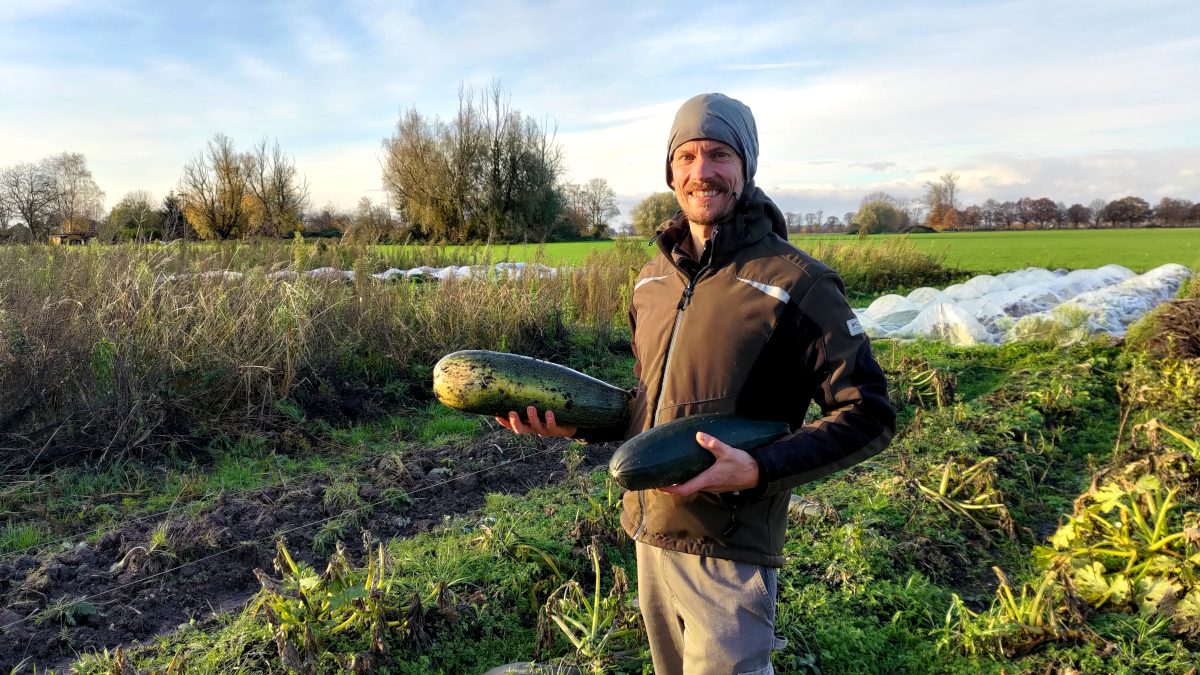
Andreas Münnig from Solawi Kleve with zucchinis
Here is the third and final part of the interview with Andreas Münnig from the'Solidarische Landwirtschaft Kleve e.V.' association.
Lars Aspermühle: What problems did you have to contend with?
Andreas Münnig: We are now in the first year of the project and of course there are a lot of problems and challenges that come up.
Especially because this is a project that I had never done before either, you first have to see how to approach it, because of course there are a lot of new things that come up.
The whole time you were actually just trying to deal with problems.
It was a constant back and forth, because various things didn't work out the way we had imagined.
And then you're under time pressure, which means that the members naturally get restless too.
Lars Aspermühle: In what way, what was the basis for discussion there?
Andreas Münnig: At the end of last year or the beginning of this year, we had communicated what we wanted to grow and roughly what harvest people could expect.
Only then we didn't know what all was coming up either.
We actually wanted to start with the whole practice in January, i.e. planting beds and setting up the whole infrastructure and so on. So we could have actually started planting or sowing in March or maybe even in February.
In that case, we could have harvested the first crops in April.
However, because we couldn't start so early because we didn't have a plot or had to change the plot again, we naturally couldn't start so early. As a result, the harvest was naturally a few weeks later.
Lars Aspermühle: That caused resentment among the members?
Andreas Münnig: Exactly. We weren't able to start all the work until April.
But then all the preparations had to be made and all the beds had to be planted, and the seeds had to be sown at the same time.
And all of this in the absolute peak season, when there is generally already a lot going on in agriculture anyway. So the first thing you have to do is create a foundation.
Rain was also a big problem this year.
That was very problematic for us at the beginning of the year because we couldn't harrow the field.
Slugs and snails were actually limited. They didn't really cause us any major problems.
Lars Aspermühle: Which surprises me a bit, because I had a lot of slugs in the garden this year.
And feedback also came from other people that there were a lot of slugs this year.
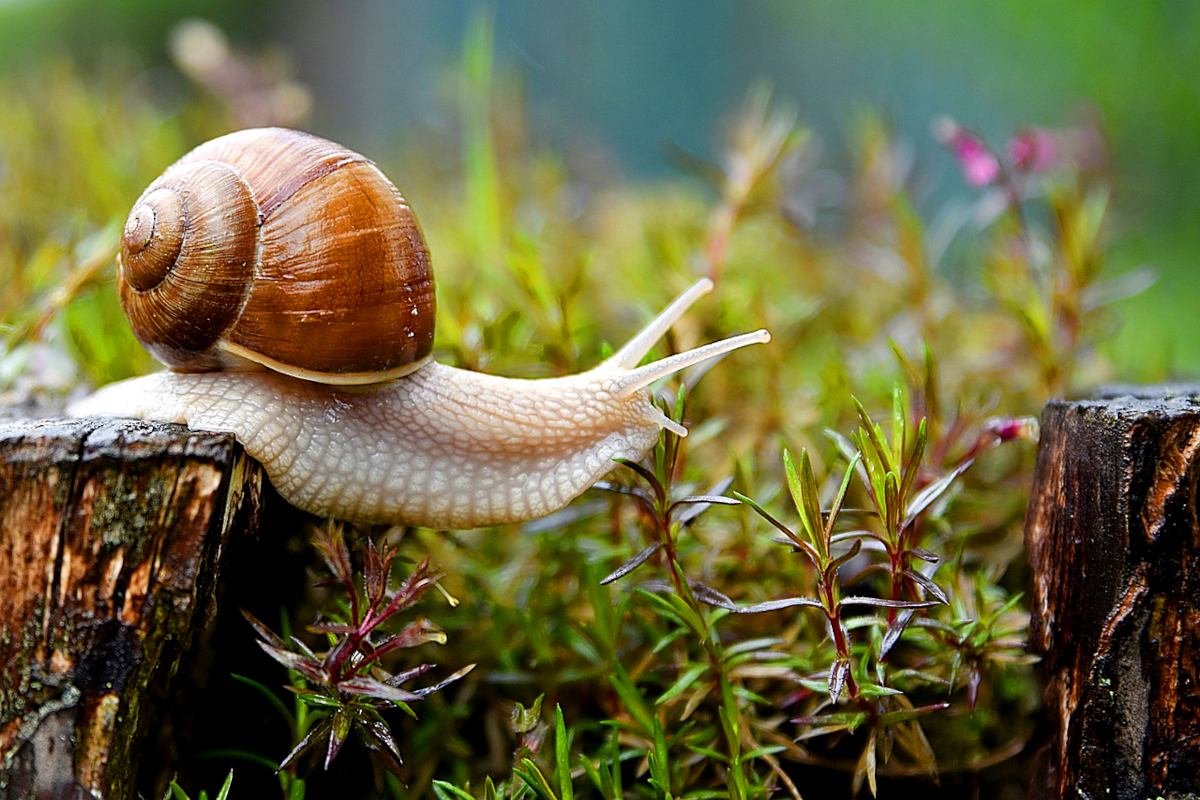
Andreas Münnig: We only had a few problems with the young plants.
We had to collect the slugs by hand, but we were able to keep that under control to some extent.
When we didn't have an area yet, I grew the young plants at home.
It was all very cramped and made control even more difficult.
Of course, you can't stop the slugs from infesting the plants.
Lars Aspermühle: You can't set up that many beer traps.
Andreas Münnig: Exactly, that's why some of our young plants were destroyed.
Lars Aspermühle: So there were definitely some start-up and planning difficulties?
Andreas Münnig: Exactly, that's in the nature of things.
Of course, some members are also dissatisfied.
But most of them are very understanding, as we are in our first year.
And accordingly, they have also adjusted to the fact that perhaps not everything is running so smoothly yet.
The fact that I run the farm and am also active in the association as a board member means that I have an extra lot to do.
That means that if there are problems in agriculture, they fall back on me and I am responsible for them and I also have the greatest responsibility in the association with the internal organization.
Lars Aspermühle: And that's certainly not ideal either, because you have to answer twice, so to speak?
Andreas Münnig: Yes, exactly. It's doubly stressful and at some point you get to a point where it all gets a bit too much and you need a break.
And when you do take a break, the members want to know why the project isn't going ahead.
Lars Aspermühle: Can you then theoretically ask the club members for more help if it gets too much for you?
Andreas Münnig: Since helping out is not compulsory, you can only make a request or build up a bit of pressure. But even that was held against me a bit because some people were dissatisfied and said that it was communicated at the beginning that help was not necessary.
That's why I only ever asked for it. For example, there are now campaign days where we ask for help and if someone wants to come, they are welcome to come and join in.
But some members were of the opinion that it was absolutely necessary to help and that wasn't their idea of the project.
Lars Aspermühle: Whereby it is, after all, solidarity farming.
If the person who is mainly responsible is overwhelmed, especially in the first year, perhaps a certain amount of understanding should be shown.
Andreas Münnig: Yes, you either help out or accept the situation as it is.
Lars Aspermühle: Exactly, so you basically have those two options, right?
Andreas Münnig: Otherwise you generally don't need to get involved in a project like this.
You should already be aware that things don't always work out the way you want them to.
Lars Aspermühle: As an outsider, I think it went really well for the first year.
When you see what and how much is growing here and how the distribution is going well, I think that's remarkable after a year. There's a lot of work involved and also a lot of successful work, if you look around here.
Lars Aspermühle: Do you also have the opportunity to take a vacation.
Andreas Münnig: Only ever taking two or three weeks' vacation is somehow not a model for me to really switch off. You just need to be away for longer.
So that you can get really creative and think your whole life through. I have so many visions and ideas when I'm away for longer. I don't have them in two or three weeks. That's just the time when I've had a bit of a break.
And I'm not just interested in going on vacation to lie on the beach, I would also work. But then I would travel to southern Spain, for example, and work in another agricultural project where I could just carry out the work and gain a bit more experience, but not think and organize all the time like I do here. Not being responsible myself.
Lars Aspermühle: How did the harvest turn out in the first year?
Andreas Münnig: It started off a bit sluggishly, as the deer ate a lot at the beginning. As a result, many crops turned out a bit puny.
For example, the lettuce heads, they ate a lot of them at the beginning. The lettuce came back and recovered, but it was very small and puny.
Those were also problems that we had to deal with.
However, the harvest then developed quite well. We learned from it and then other crops were added. In the end, from mid-July and August, we actually had a very good harvest.
We then received feedback from the members that the quantity was satisfactory.
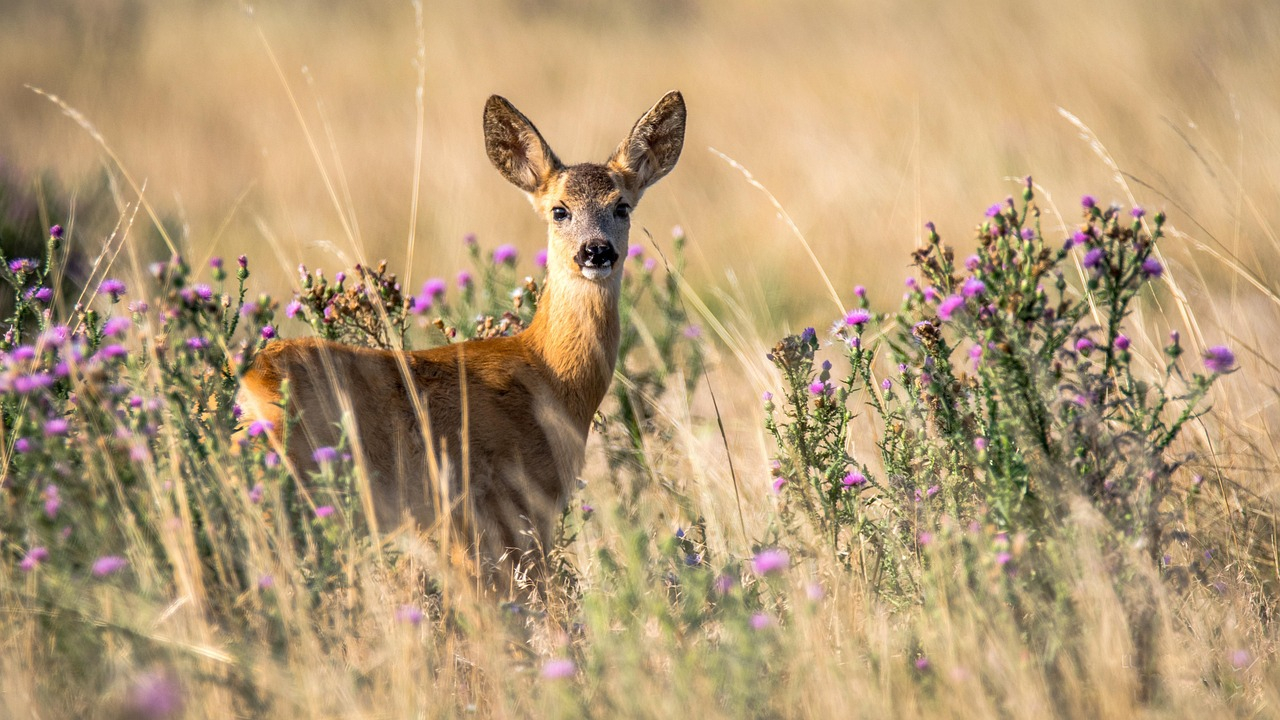
Lars Aspermühle: You just mentioned the deer. Do you generally do anything to control pests? How do you stop the deer from eating here?
Hares are perhaps also a problem. What measures do you take against them?
Andreas Münnig: Well, with the deer, of course we considered putting up a deer fence.
But that's very time-consuming and cost-intensive and you're too isolated from the surrounding area. I'm not necessarily a fan of fences. That's why we worked with crop protection nets this year.
Lars Aspermühle: A cover for the plants, so to speak?
Andreas Münnig: Exactly, we simply stretched a net over it.
Then the deer can no longer get into the crops. That has already helped.
Even with crops where you don't actually need a crop protection net, we still had to put a net over them because of the deer. Before that, we had a lot of losses.
The animals always ate the tops off the peas and beans and
the green parts of the beet, lettuce and chard.
Lars Aspermühle: With such a relatively small area, this is of course also noticeable.
Andreas Münnig: Of course, these are also special plants here. The deer can then run from one crop to the next and one tastes better than the other.
Lars Aspermühle: So a deer is a gourmet!
Andreas Münnig: Yes, exactly
Lars Aspermühle: Are there any other pests,besides deer and snails?
Andreas Münnig: A few hares, where the handling is about the same as with the deer.
Otherwise only a few snails on the cabbage. But all in all, it was actually still within limits.
We regularly hoe between the plants to prevent the snails from destroying their nests.
Of course, we also had a few diseases on the plants here.
Tomatoes get blight at some point.
Lars Aspermühle: But maybe it's different with a project like this than with a supermarket product?
It can't have any scab or anything like that. That's probably not so relevant for you here?
Andreas Münnig: Exactly, things that have a few flaws are also included in the boxes.
I think some members aren't quite so happy about that and some people don't really care. Overall, it's accepted.
There have been a few burst tomatoes that have been criticized. Of course, they don't keep as long and you have to use them straight away.
Lars Aspermühle: But you didn't have any major crop failures?
Andreas Münnig: Yes, definitely because of the deer. Larger quantities have already been lost.
But not because of other pests or diseases.
As I said, I was a bit worried about the cabbage and the slugs.
But it actually still went well. The red cabbage was a bit more affected
But I hope it will still be okay.
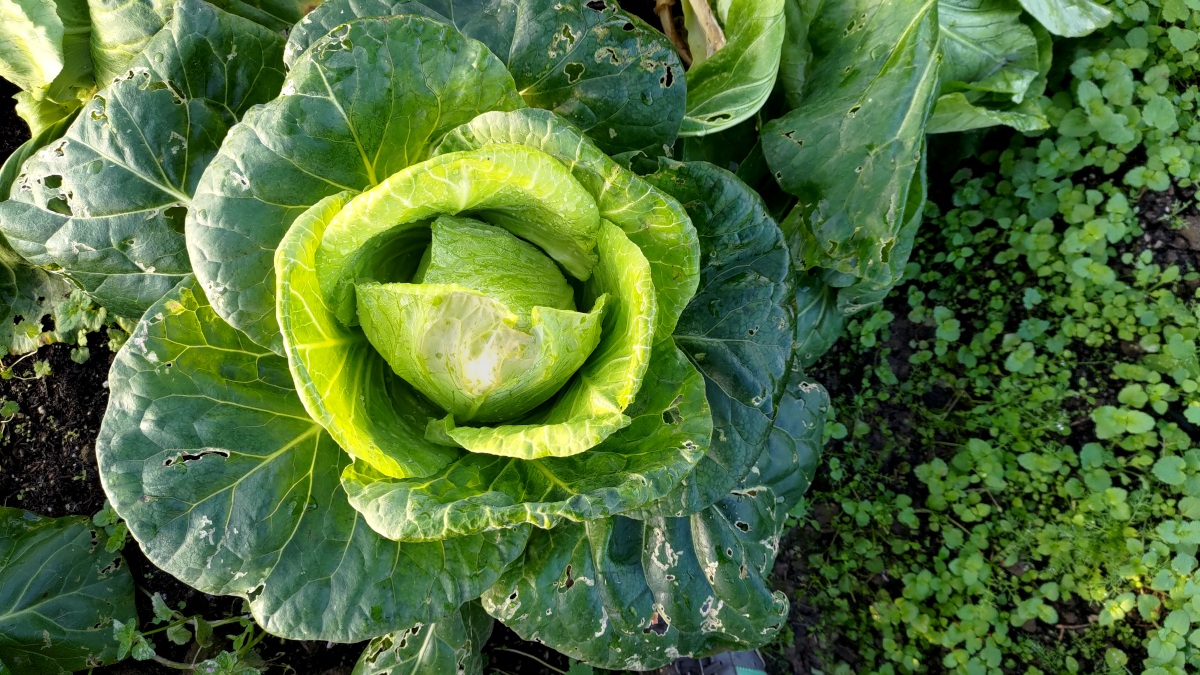
Cabbage head in the Solawi field
Lars Aspermühle: What changes are planned for next year?
Andreas Münnig: We still don't have all of our market gardening areas in use at the moment. There are still some beds to be planted. A total of 100 beds are to be created in this Market Gardening area.
We've currently created about half of them.
And we want to finish all of that for next year.
That's the minimum requirement for the moment. We need around 2,500 square meters for that. That means we'll still have just under 5,000 square meters left for other things. That hasn't been fully planned yet.
It also depends on how much help we get and what financial resources we have. If we keep it very simple, we'll just sow a basic fertilizer or flowering meadow.
If we have more possibilities, we could possibly create beds with perennial plants. Perhaps also grow soft fruit bushes.
Lars Aspermühle: Raspberries, for example, are good, aren't they?
Andreas Münnig: Yes, exactly, you could do that. I would also like to plant a few beds with herbs.
Maybe kitchen herbs or tea herbs.
Lars Aspermühle: What number of members are you aiming for?
Andreas Münnig: We should actually double in size for next year.
The detailed budget planning is not quite finished yet, but at the moment it looks like it should be at least 40 harvest shares.
Lars Aspermühle: To make it profitable and make all the work worthwhile?
Andreas Münnig: Exactly, this year it wasn't actually economically viable yet.
We could now pay a mini-jobber, but I couldn't really pay myself for that, or only very little.
That was okay for me too, because the project means more to me than just having an income and I just wanted this project to come to fruition.
But it can't be a permanent solution, so it would be nice if I could make a living from it. We would have to have at least 40 harvest shares for that, probably more like 43 harvest shares.
We could provide up to almost 75 harvest shares here on the Market Gardening area if we really cultivate all 100 beds and then additional projects, like the herb beds.
That's how this project builds up a bit.
If there are more members, the range of different crops increases once again.
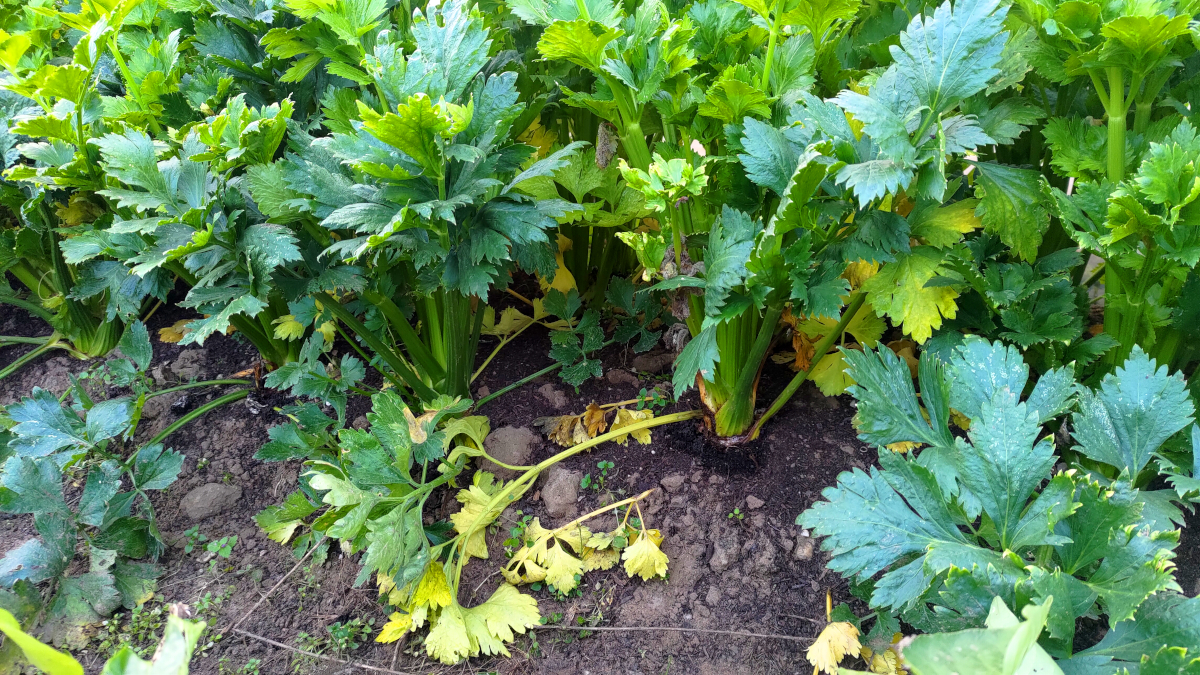
Celery
Lars Aspermühle: As a food producer, do you have to comply with legal regulations or what regulations are there in this area?
Andreas Münnig: There are of course certain regulations, for example the Fertilizer Ordinance, which you have to adhere to of course.
Lars Aspermühle: Or is there also a certain legal responsibility when you sell or market your food?
Andreas Münnig: When I registered the business, I of course had to attend a course at the health department, a hygiene training course for food.
But it was just a video, which I had to watch. You watch a video and do a test and then you get confirmation that you've done it.
Lars Aspermühle: As a food producer, do you need insurance or other legal protection?
Andreas Münnig: We don't have any insurance at all at the moment, but we definitely want to take out director and officer insurance for next year or in the near future so that the board of directors is a bit covered.
That they can't be held liable with their private assets.
Lars Aspermühle: Yes, I would perhaps also look again at the extent to which you are liable if you produce food.
Andreas Münnig: Right, so I haven't really thought about that yet.
But I had already thought about the fact that if I produce food in the kitchen now, that could of course be problematic because I didn't have a commercial kitchen.
But of course, it's not necessarily the case that something happens to the plants outside in nature. It's only when someone touches them and then packs them into boxes and takes them to the pick-up station that you have to comply with the hygiene regulations.
So it might make sense to take out insurance.
Lars Aspermühle: Are there things that are not worthwhile for cultivation?
Where the yield is too low or too much work has to be invested, i.e. the amount of work is not in proportion to the cultivation?
That perhaps too much has to be sorted out afterwards.
Andreas Münnig: Sure, you can only grow crops and plants that can cope with the climatic conditions here.
Although there are other options now.
For example, one of my friends will soon be planting a mandarin,
I think even an orange variety.
There are now varieties that can cope with temperatures as low as minus 10 or minus 15 degrees.
It's no longer so common here in the Lower Rhine region for temperatures to fall below this.
And if they do, then not for more than a day. In most cases, the varieties can cope with this or you protect them with a thick layer of straw and then they survive.
Then you could also grow mandarins or oranges here. Or avocados, for example, there are varieties that can survive at just under minus 10 degrees.
I think pomegranates can also be grown here, depending on the variety.
Lars Aspermühle: The fact that originally Mediterranean plants don't get as much sun here would of course have an effect on the taste.
Andreas Münnig: It is questionable whether it is worth using the land for this under this aspect. It might be better to leave the cultivation in the Mediterranean region. Then it would be better to start cooperations with projects from the Mediterranean region.
Maybe look for a farm that follows the same agricultural ideals as we do.
Start a cooperation and then have a large delivery of olives or olive oil come once a year.
There are also some oranges, all sorts of things, everything that can't be grown here could be run via this channel.
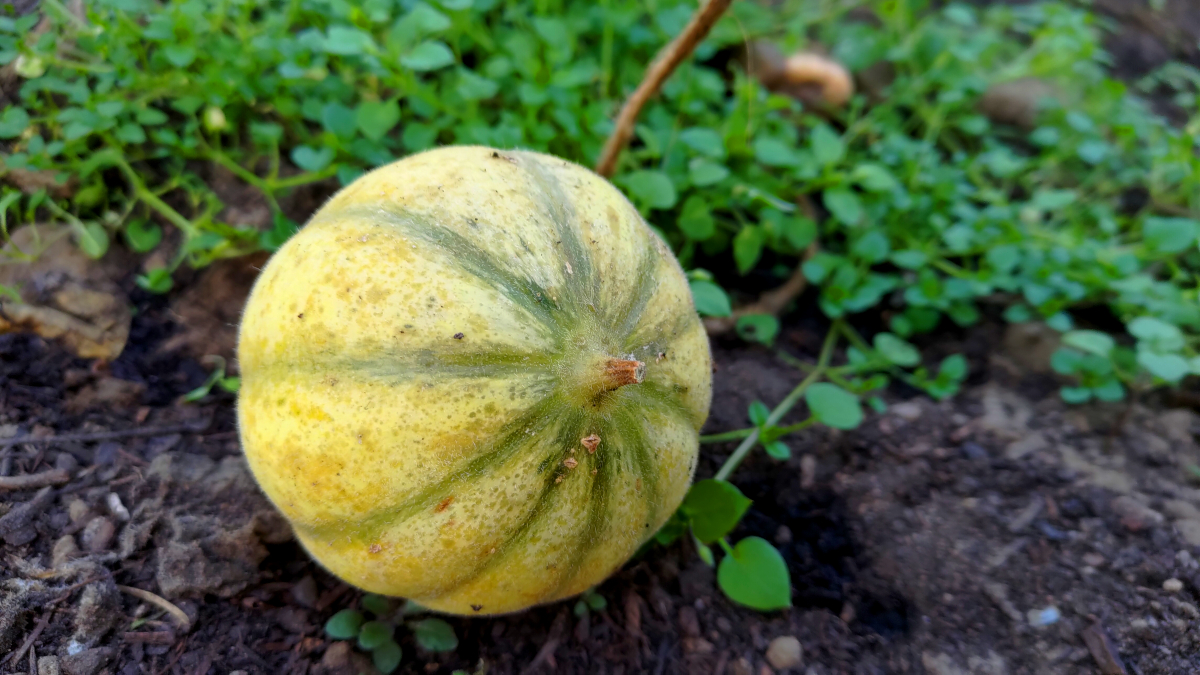
Melons are now also growing in the Solwai greenhouse
Lars Aspermühle: Yes, something like that is of course good, that farmers from there then also supply fixed shares to other regions and are sure that they will be safely accepted.
Andreas Münnig: Yes, and everything that can be grown here can also be included in the program here.
Actually, it's always more about what the members want.
And then you can look afterwards to see how much effort is required for the corresponding crops.
Lars Aspermühle: What are the plans for the future? Can you say something again?
Andreas Münnig: At the moment, we still have a lot to do with the acute construction sites.
So that we can get a bit of everyday life in there first.
Until we get to the point where we can optimize all the processes and everything runs smoothly and that we can go into more detail and do more development.
Then, of course, there is also the question of what the members' expectations are and how many members will stay with us permanently. The boundaries are actually very wide.
So you can go in different directions.
You can simply increase the range with new products and go into processing again.
You can have campaign days where you perhaps make your own spreads, preserve them or harvest redcurrants and make jam and jelly.
And then you would also have more for the winter.
And you could then go even further into the year-round season.
For example, as I mentioned earlier, you could start collaborations with other projects and expand your range again.
My personal vision is that you could become completely independent of store-bought food, i.e. detach yourself from large supermarket chains.
Decentralize everything a little.
There's this great phrase:
Community-supported agriculture takes the price out of food and gives it back its value.
In principle, you can go even further and go beyond the food sector. You can also bring other products on board, such as clothing.
So anything that can be grown, textiles of course, or wood.
You can also make clothes from nettles. Hemp cultivation is of course a very good thing ecologically.
Of course, I think the processing is a bit more difficult.
I think it's quite complicated, especially for clothing.
The fibers have to be broken up.
Lars Aspermühle: I know this from the wool sector, for example, when you have fibers that are too scratchy.
In Scotland, for example, there are attempts to chemically smooth the fibers. (This is discussed in the following video, among others)
Andreas Münnig: If you then have to process it all so highly, it's not so nice anymore.
In any case, there are no limits to creativity.
Networking is also important.
So there is the Solidarity Farming Network.
This is a Germany-wide network that connects the solidarity farms that exist in Germany.
You can register there and exchange ideas.
They also offer a lot of courses and we definitely want to become a member so that we can benefit a little from the experience of others.
Firstly, to register, but also to do more networking in general and to network more with other projects and exchange experiences that others have already gathered, as well as failures that you can do without.
So both in the area of community-supported agriculture, but also in the area of market gardening.
Lars Aspermühle: Maybe again on that, what is the difference between market gardening and solidarity agriculture?
Andreas Münnig: In principle, community-supported agriculture is the economic model of how you get the food to consumers.
And market gardening is the way you do the cultivation.
So they're just different techniques and methods.
For example, we don't do any soil cultivation here and we have these special permanent beds.
In principle, everything we do is very standardized.
We always have these 75-centimetre-wide beds and we always have the beds slightly raised.
In between, there are always the paths, which are slightly lower.
If it rains a lot, the water would now flow onto the paths and would then also drain more deeply.
This also means that the roots tend to grow deeper, not wider, and you can plant the plants a little closer together. This is also more effective.
Lars Aspermühle: In principle, market gardening is a way of growing very efficiently and regeneratively at the same time.
Andreas Münnig: Exactly, a kind of regenerative agriculture.
We also want to build up the humus over time and improve the overall quality of the soil and create as many cycles as possible.
You can find the first part and the second part of the interview under the following links.